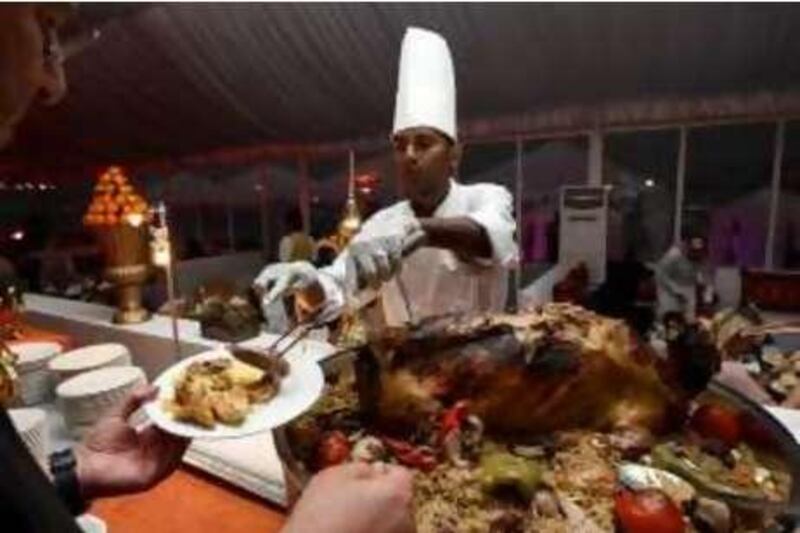Abu Dhabi // At least 500 tonnes of food is thrown away every day during Ramadan, an environment chief said yesterday. In an effort to cut the waste the Environment Agency - Abu Dhabi (EAD) launched a "Think Before You Waste" campaign.
"Culturally, there is much emphasis on providing bountiful meals in celebration of this special month, but the impact of the wasted food is not really considered," said Majid al Mansouri, EAD's secretary general. "A simple way to reduce food waste is to cook less in the first place, or to think twice before piling up one's plate at the iftar buffet." Food waste contributes to climate change, since food rotting in landfills produces methane, a powerful greenhouse gas, said Abdulnasser al Shamsi, EAD's executive director.
"While many food products are ultimately biodegradable, their non-consumption means that precious resources used in their cultivation and production are wasted, such as energy, water and materials used for packaging," he said. The campaign also reminds the public that the Quran tells Muslims to avoid waste, pointing to a passage that says "eat and drink, but be not excessive. Indeed, he likes not those who commit excess".
Although the economic crisis could cut the amount of waste, significant reductions were unlikely until people change their ways, Mr al Mansouri said. The General Authority of Islamic Affairs and Charitable Endowments (Awqaf) is also taking part in the campaign, communicating with imams to ensure that the message to be moderate with food is part of the first Friday prayer of Ramadan. While food waste is at its highest during Ramadan it is a problem throughout the year, with authorities estimating that food accounts for 34 per cent of the country's waste.
In this, the UAE is no different from other wealthy nations. Last year Britain threw away 8.3 million tonnes of food, equal to nearly 23,000 tonnes a day. One British newspaper estimated that all the food wasted in Britain and the US could feed 1.5 billion people. Part of the reason for so much wasted food is cultural, said Khadim al Darei, a member of the board of directors of the UAE Red Crescent Authority. Having plentiful food for guests, and anyone who might ask for it, is part of the generosity expected of Muslims during Ramadan, he said.
Mr al Darei is also the chairman and founding committee member of Hefth Al Ne'ma, a charity that collects leftover food from large gatherings such as weddings and banquets. An initiative of Sheikha Shamsa bint Hamdan Al Nahyan, the charity has been active since 2004 and last year distributed more than 24,000 hot meals to 1,000 needy families and 10,000 low-income labourers. This year, Hefth Al Ne'ma will be collaborating with some of Abu Dhabi's five-star hotels to redistribute food that is about to be thrown away but still safe to eat. He said that while people should try not to waste food in the first place, they can contact the charity if they have large amounts left over after big functions.
He warned, however, that the charity takes strict food safety and hygiene precautions. "If it has been exposed to outside temperatures or touched, we cannot take it," he said. Not all hotels are able to contribute, however. Fayaz Samsudeen, the assistant director of food and beverage at the Shangri-La Hotel Qaryat Al Beri, Abu Dhabi, said that because of its food safety and hygiene management programme "we are unfortunately unable to participate in such efforts". Staff try to compensate, he said, by taking steps to minimise the amount of leftover food.
"It is a commendable initiative," he said. "People can enjoy festive buffets and functions responsibly by knowing what they want to eat, and having a sound sense of awareness about their limits - you don't want your eyes to be bigger than your stomach." @Email:vtodorova@thenational.ae






